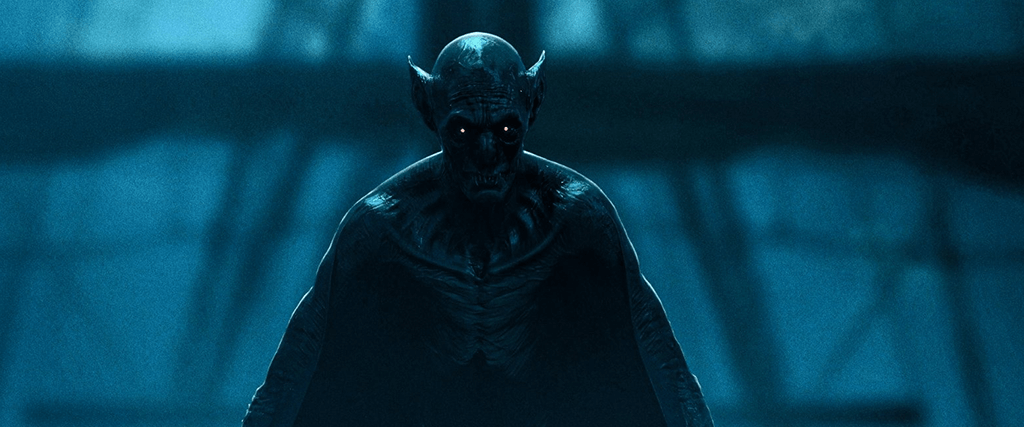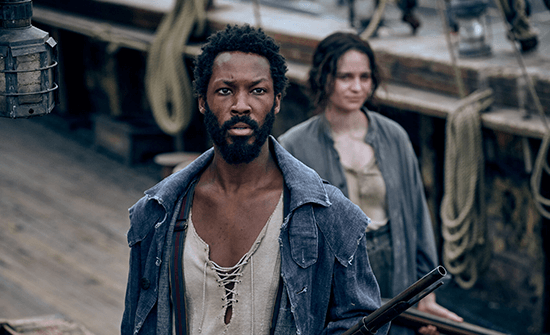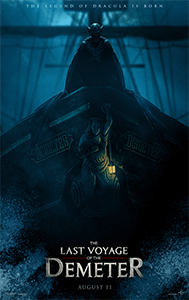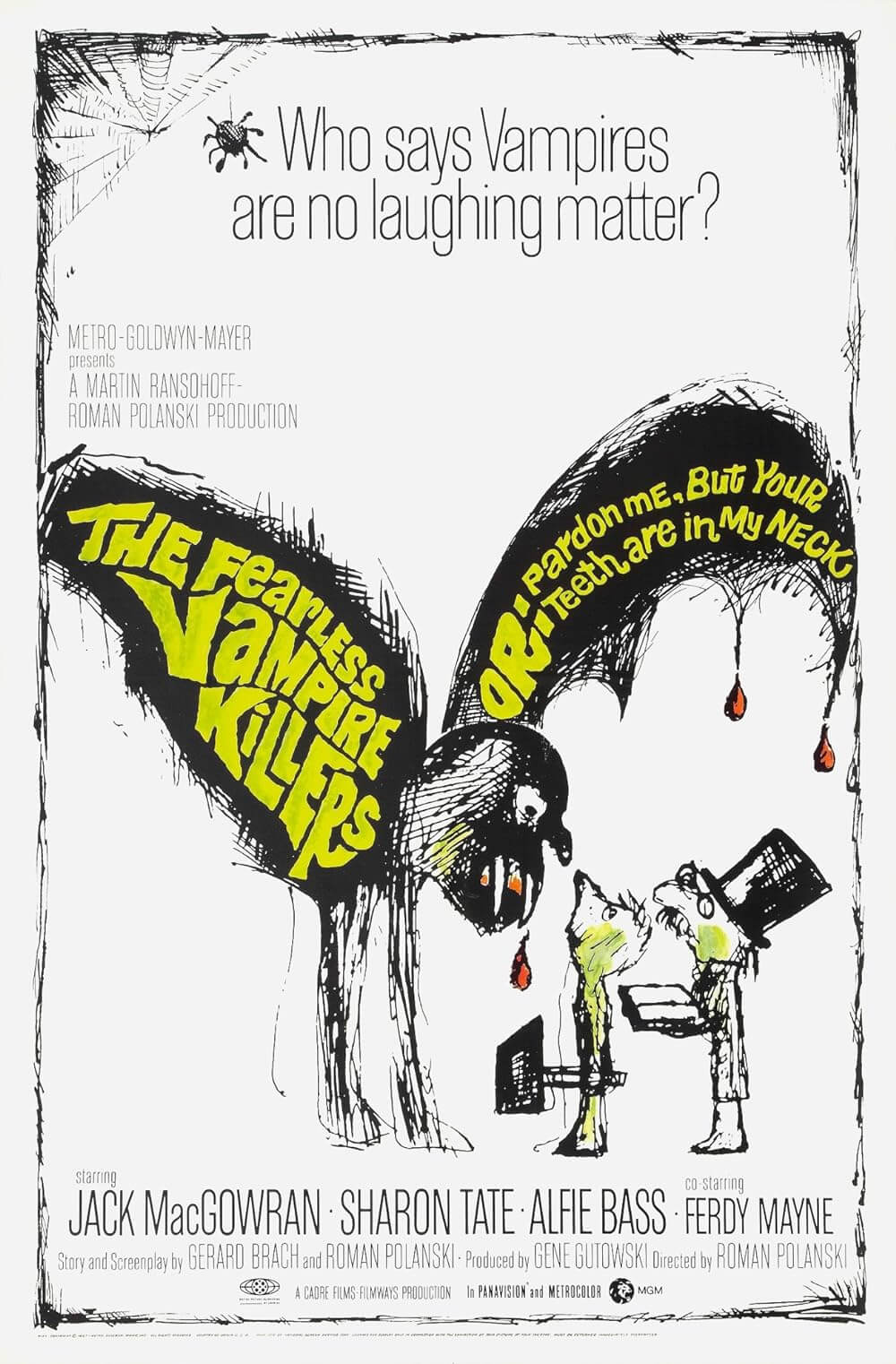
The Last Voyage of the Demeter
By Brian Eggert |
The Last Voyage of the Demeter is a B-movie masquerading as a stately period piece—an observation I make with earnest admiration. Based on a brief chapter from Bram Stoker’s epistolary novel Dracula, the production boasts a convincing nineteenth-century mise-en-scène thanks to production designer Edward Thomas and costumer Carlo Poggioli. The film’s self-serious tone and subject matter recall similar costume horror stories from Hammer Film Productions (Dracula, 1958) or American International Pictures (The Masque of the Red Death, 1964), presenting a gristly yarn with attention to period detail, yet no shortage of bloodshed. Director André Øvredal delivers a handsome film, told with patience and a refreshing lack of irony, about the ill-fated crew of the ship that carried the granddaddy of all vampires from Bulgaria to England. It’s the sort of film where no one’s safe—not the dog, not the kid, and not anyone clinging to their rosary for protection. And after the exceedingly sardonic and fangless Renfield earlier this year, it’s refreshing to see Dracula scary again.
The cinematic imagery of Dracula’s journey to England on the Demeter goes back a century to F.W. Murnau’s Nosferatu (1922), where Max Schreck’s looming figure emerged from crates of earth and proceeded to feed on the ship’s crew. But in Øvredal’s hands, the genre-savvy viewer will notice the material bears striking similarities to a different source—Alien (1979). Although Ridley Scott’s sci-fi classic about blue-collar astronauts confronted by an unstoppable creature inspired many imitations set in the jungle (Predator, 1987), underwater (Leviathan, 1989), and of course, space (Pitch Black, 2000), The Last Voyage of the Demeter might be the first to take place on a sea vessel. Like Scott’s decision to obscure the xenomorph in shadows and among ducts, never showing the alien in full until the climactic scenes, Øvredal turns Dracula into a feral monster looming in the shadows for much of the two-hour runtime, feeding on sailors who have no idea what’s hunting them.
Long in development with various directors and performers attached over the years, the story by Bragi Schut Jr. was initially inspired by miniatures from Francis Ford Coppola’s sublime Bram Stoker’s Dracula (1992), where the Demeter has no more than a minute or so of screen time. This film’s script, penned by Schut and Zak Olkewicz, opens in 1897 on the coast of Whitby, England, where the Demeter arrives sans crew and blood splattered on the sails. The local magistrate finds the captain’s log, which offers a grim final passage: “We tried to stop him. If we didn’t succeed, God have mercy on your souls.” The screenplay inconsistently returns to the log, in voiceover, after jumping back four weeks to the port in Varna. There, Captain Eliot (Liam Cunningham) and his first mate Wojchek (David Dastmalchian) assemble a small crew to transport mysterious crates from Romania, each marked with a dragon symbol that spooks the locals. This doesn’t faze Clemens (Corey Hawkins), a Cambridge-educated and world-weary doctor trying to make sense of the world, who joins the superstitious crew.
 During a storm, one of the crates falls and cracks open. Clemens finds a young woman, Anna (Aisling Franciosi), hidden in the dirt. Unwillingly serving as Dracula’s traveling juice box, Anna’s care under Clemens prompts the vampire to emerge from his slumber and feed on the ship’s crew. At first, the crew can’t make sense of the disappearances and slaughtered livestock, chalking it up to some manner of plague. Eventually, they realize “evil is on board.” Unlike Murnau with Nosferatu, Øvredal doesn’t treat Dracula as a figure who rises like a rigid plank out of his crate; instead, the villain behaves more animalistically, crawling on the deck and hiding in the shadows. What glimpses we catch of him look humanoid, albeit batlike too—a flat-out monster that in the later scenes, unfortunately, is rendered with takes-you-out-of-the-moment CGI. However, when Javier Botet performs the guy-in-a-costume Dracula, it’s a chilling sight, recalling Gary Oldman’s bat creature in Coppola’s film.
During a storm, one of the crates falls and cracks open. Clemens finds a young woman, Anna (Aisling Franciosi), hidden in the dirt. Unwillingly serving as Dracula’s traveling juice box, Anna’s care under Clemens prompts the vampire to emerge from his slumber and feed on the ship’s crew. At first, the crew can’t make sense of the disappearances and slaughtered livestock, chalking it up to some manner of plague. Eventually, they realize “evil is on board.” Unlike Murnau with Nosferatu, Øvredal doesn’t treat Dracula as a figure who rises like a rigid plank out of his crate; instead, the villain behaves more animalistically, crawling on the deck and hiding in the shadows. What glimpses we catch of him look humanoid, albeit batlike too—a flat-out monster that in the later scenes, unfortunately, is rendered with takes-you-out-of-the-moment CGI. However, when Javier Botet performs the guy-in-a-costume Dracula, it’s a chilling sight, recalling Gary Oldman’s bat creature in Coppola’s film.
Dracula purists may balk at the mostly dialogue-less monster behaving like a wild beast instead of a sinister, even romantic figure. Still, Øvredal keeps the viewer invested with some commanding performances. Though the setup suggests the film might orbit around the captain—as ever, Cunningham is a sturdy presence—Hawkins occupies the lead role, offering an intelligent character who refuses to believe in myths and legends, even after he’s confronted by a turned sailor burning up in the sunlight. Franciosi, best known for Jennifer Kent’s searing The Nightingale (2019), feels underserviced by the script, her role shedding only minor light on Dracula’s backstory. It’s a disappointing use of Anna since, for a while there, it seemed as though she might turn into this film’s equivalent of Ellen Ripley. But Øvredal gives each of these actors ample screen time to shine, with cinematographer Tom Stern often deploying generous close-ups to showcase their distinct faces.
What I appreciated about The Last Voyage of the Demeter is that Øvredal doesn’t rush into the proceedings. The story unfolds at a measured pace, with much of the first two-thirds drenched in darkness, fog, and shadows. The Demeter is an evocative space, with damp, creaky wood and plenty of areas for Dracula to hide, and not unlike the spaceship in Alien, the camera might pass by the monster without the audience noticing at first. Once the bloodshed kicks into gear, Øvredal doesn’t spare the gore either; this is a true R-rated horror movie, making Dracula frightening and visceral. If the occasional splash of CGI distracts, and the final coda hints at a sequel that will probably never come, that doesn’t rob the film of supplying a worthwhile effort, whereas other recent examples—such as the dull origin story, Dracula Untold (2014)—make far too many compromises. Effective in its claustrophobic setup and how it considers a minor section of literary history, the film may pleasantly surprise those who are curious.

Thank You for Supporting Independent Film Criticism
If the work on DFR has added something meaningful to your love of movies, please consider supporting it.
Here are a few ways to show your support: make a one-time donation, join DFR’s Patreon for access to exclusive writing, or show your support in other ways.
Your contribution helps keep this site running independently. However you choose to support the site, please know that it’s appreciated.
Thank you for reading, and for making this work possible.
Brian Eggert | Critic, Founder
Deep Focus Review







